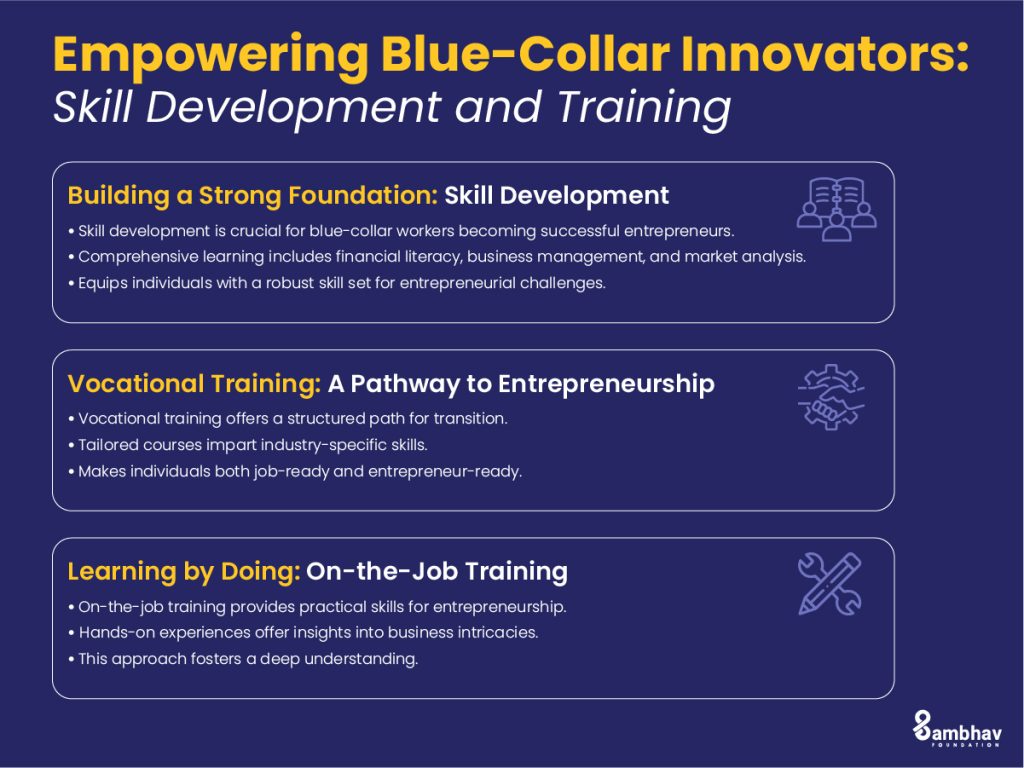Navigating the Entrepreneurial Landscape: Tools for Blue-Collar Innovators
Supporting blue-collar workers in their transition to entrepreneurship offers vast potential. Through skill development, vocational training, and community backing, these dreams can evolve into flourishing businesses. In this blog, readers will read how these innovators contribute to community growth and personal development, showcasing the power of support systems.
Navigating the Entrepreneurial Shift: Challenges and Solutions
Understanding the Transition Hurdles
Transitioning from blue-collar roles to entrepreneurship isn’t without its challenges. Blue-collar workers often face hurdles related to limited business knowledge, access to resources, and financial stability. Such barriers can be overwhelming, hindering their journey to entrepreneurship.
The Power of Skill Development
To overcome these challenges, blue-collar workers require skill development and vocational training. These initiatives empower them with the knowledge and expertise needed to navigate the complexities of entrepreneurship. Skill development not only equips them with practical abilities but also boosts their confidence, ensuring a smoother transition into the entrepreneurial landscape.

Empowering Blue-Collar Innovators: Skill Development and Training
Building a Strong Foundation: Skill Development
Skill development training plays a pivotal role in the journey of blue-collar workers turning entrepreneurs. These programs provide comprehensive learning experiences, encompassing a wide array of skills such as financial literacy, business management, and market analysis. This equips individuals with a robust skill set, essential for navigating the challenges of entrepreneurship successfully.
Vocational Training: A Pathway to Entrepreneurship
Vocational training courses offer a structured path for blue-collar workers to transition into entrepreneurship. These courses are tailored to impart industry-specific skills, making individuals not just job-ready but also entrepreneur-ready. The specialised knowledge gained through vocational training empowers them to pursue business opportunities with confidence.
Learning by Doing: On-the-Job Training
On-the-job training serves as an invaluable tool for acquiring practical skills essential for entrepreneurship. Through hands-on experiences, blue-collar workers gain insights into the intricacies of running a business. This immersive approach fosters a deep understanding of real-world challenges and how to address them effectively.
Inspiring Success Stories
Sharmila’s Empowerment Journey

Meet Sharmila from Villianoor, Pondicherry, who embarked on a journey of self-empowerment. After completing her Beauty & HairCare course, she established a parlour cum boutique, inaugurated by Shaibal, generating an impressive monthly income of approximately INR 30,000. Furthermore, she extended her impact by employing AnuShruthi, another Prabhat beneficiary who completed the same course. AnuShruthi earns INR 7,000 per month. Sharmila’s enterprise fulfils embroidery orders and provides livelihoods for two more individuals working based on demand. Sharmila’s story shows how one woman’s empowerment can uplift an entire community.
Technical Education: Empowering Blue-Collar Innovators
The Significance of Technical Vocational Education and Training
Technical Vocational Education and Training (TVET) serves as a cornerstone in the journey of blue-collar workers transitioning to entrepreneurship. These programs are designed to equip individuals with specialised technical skills that are vital for entrepreneurial success. The comprehensive nature of TVET ensures that aspiring entrepreneurs have the knowledge and expertise needed to thrive in their chosen ventures.
Crucial Role of Technical Skills in Entrepreneurial Success
Technical skills are indispensable for entrepreneurs in various sectors. Whether it’s mastering machinery in manufacturing, understanding complex software in information technology, or implementing innovative solutions in healthcare, technical prowess is a driving force behind success. Blue-collar innovators who undergo technical education are well-prepared to navigate the intricacies of their chosen industries, ensuring competitiveness and sustainability in their entrepreneurial endeavours.
Examples of Technical Education Programs
Sambhav Foundation offers a diverse range of technical education programs tailored to the unique needs of aspiring entrepreneurs. These programs empower individuals with specialised skills, paving the way for their entrepreneurial success. Here are some of the programs:
- Automobile Mechanics: This program falls under technical education, focusing on vehicle maintenance and repair.
- CNC Operators: A technical program specialising in precision manufacturing using Computerised Numerical Control machines.
- Information Technology: This program encompasses technical aspects such as data entry operations, hardware maintenance, and digital literacy.
Impact on Community and Individual Growth: Fostering a Brighter Future
Supporting blue-collar innovators on their journey to entrepreneurship extends far beyond individual success; it has a ripple effect that profoundly impacts both communities and the individuals within them.
Broader Impact of Supporting Blue-Collar Innovators
When blue-collar workers transition to entrepreneurship, they often become catalysts for positive change within their communities. By creating businesses and employment opportunities, they contribute to economic growth and stability in their regions. Additionally, their entrepreneurial ventures can address specific community needs, such as affordable housing, healthcare services, or sustainable agriculture. This broader impact leads to more vibrant and resilient communities.
The Connection Between Community Upliftment and Individual Growth
The relationship between community upliftment and individual growth is symbiotic. As blue-collar innovators succeed in their entrepreneurial endeavours, they not only improve their own economic circumstances but also uplift those around them. By providing job opportunities and investing in community projects, they enhance the overall quality of life for residents. Simultaneously, as communities thrive, they create a nurturing environment that further supports individual entrepreneurial growth.
Long-Term Benefits of Support for Community Development
The support provided to blue-collar innovators in their transition to entrepreneurship has long-term benefits for community development. As these entrepreneurs establish and expand their businesses, they contribute to the sustainable growth of their communities. Over time, this leads to increased infrastructure, improved education and healthcare services, and enhanced overall well-being. Such long-lasting positive changes underscore the importance of ongoing support for blue-collar workers seeking to make the leap into entrepreneurship.
By recognizing the broader impact of supporting blue-collar innovators, we acknowledge the potential for positive change that extends well beyond the individual, ultimately fostering more prosperous and resilient communities.
The Role of Mentoring and Networking
Mentorship plays a pivotal role in the entrepreneurial journey of blue-collar workers, offering them guidance, wisdom, and a roadmap to success. Here, the readers will explore the significance of mentorship, share examples of successful mentorship programs, and emphasise the value of building a robust network to support blue-collar entrepreneurs.
The Significance of Mentorship
Mentorship is a guiding light that helps blue-collar entrepreneurs navigate the often complex terrain of entrepreneurship. Having a mentor provides several advantages, including:
- Experience-Based Learning: Mentors share their own experiences and insights, allowing mentees to learn from real-world scenarios and challenges.
- Network Expansion: Mentors often have extensive networks that they can tap into, introducing mentees to valuable contacts, potential partners, or investors.
- Personal Growth: Beyond business, mentorship fosters personal growth by boosting mentees’ confidence and decision-making abilities.
Mentorship can bridge knowledge gaps and accelerate the entrepreneurial journey, making it an invaluable resource for blue-collar workers.
Building a Network to Support Blue-Collar Entrepreneurs
In addition to mentorship, building a supportive network is crucial for blue-collar entrepreneurs. Networking can:
- Provide Resources: A robust network can offer access to resources like capital, suppliers, and potential customers.
- Offer Peer Support: Interacting with fellow entrepreneurs allows for the exchange of ideas, insights, and solutions to common challenges.
- Boost Visibility: Networking can enhance the visibility of blue-collar entrepreneurs, leading to partnerships, collaborations, and business growth.
Building a network may involve attending industry events, joining local business groups, or participating in online forums and communities. The process can be empowering, helping blue-collar entrepreneurs overcome hurdles and thrive in the entrepreneurial landscape.
Access to Funding and Financial Resources
Access to capital and financial resources is the lifeblood of entrepreneurship, and for blue-collar innovators, it can be a game-changer. In this section, the readers will explore the critical importance of access to funding, government initiatives, and strategies for securing financial resources effectively.
The Importance of Access to Capital and Financial Resources
For blue-collar workers transitioning to entrepreneurship, access to capital and financial resources is paramount. These resources fuel business growth, provide working capital, and enable entrepreneurs to invest in infrastructure, technology, and talent. Access to funds is often the catalyst that turns a promising idea into a thriving business.
Government Initiatives and Grants for Aspiring Blue-Collar Entrepreneurs
The government of India recognizes the potential of entrepreneurship and has launched initiatives and grants to support blue-collar innovators. Some noteworthy programs include:
- Saksham: Launched by the Technology Information, Forecasting, and Assessment Council (TIFAC), Saksham is a job portal designed to connect blue-collar workers with nearby MSMEs, reducing the need for middlemen or labour contractors.
- Startup India Scheme: Startup India is a flagship initiative that offers a range of benefits to startups, including blue-collar entrepreneurs. These benefits include funding opportunities, tax benefits, easy registration processes, and access to a network of mentors and investors.
- Mudra Yojana Scheme: Aimed at small and micro enterprises, including startups, this scheme offers loans of up to INR 10 lakhs to meet their financial requirements.
- Stand-Up India Scheme: This scheme focuses on promoting entrepreneurship among women and SC/ST entrepreneurs. It provides financial support in the form of loans to eligible entrepreneurs to start or expand their businesses.
- Atal Innovation Mission (AIM): AIM fosters innovation and entrepreneurship by offering funding, mentorship, and support to startups and entrepreneurs working on innovative ideas.
- Pradhan Mantri Mudra Loan Yojana (PMMY): This scheme offers loans without collateral security to small and micro enterprises, including startups, for various business needs.
These government initiatives and grants serve as lifelines for blue-collar innovators, providing them with the financial resources needed to launch and sustain their entrepreneurial endeavours.
Strategies for Securing Funding and Managing Finances Effectively
Securing funding and managing finances effectively are critical skills for blue-collar entrepreneurs. Strategies include creating a solid business plan, exploring various funding options such as loans, grants, and crowdfunding, and adopting sound financial management practices. Additionally, seeking guidance from mentors or industry experts can be instrumental in navigating the financial landscape.
By combining these strategies with access to government initiatives and grants, blue-collar innovators can build a strong financial foundation, ensuring their businesses have the resources needed to thrive.
Measuring Impact and Future Prospects
Tools and Metrics for Measuring Impact
Assessing the impact of blue-collar entrepreneurial initiatives is crucial for ensuring their effectiveness. Various tools and metrics can be employed to measure this impact. Key performance indicators (KPIs) may include the number of businesses started, jobs created, increase in income levels, and improvements in community well-being. Surveys and feedback mechanisms can help gather qualitative data on the experiences and satisfaction levels of blue-collar entrepreneurs.
The Potential for Scalability and Replication
Successful blue-collar entrepreneurial programs hold significant potential for scalability and replication. By analysing what works and why, these initiatives can be adapted and expanded to benefit a larger audience. Collaborations with governmental bodies, nonprofits, and private sector partners can facilitate the replication of successful models across different regions and industries. This scalability ensures that the impact reaches far and wide, creating a ripple effect of economic and social benefits.
The Outlook for the Future and Ongoing Need for Support
The future outlook for blue-collar entrepreneurship is promising. As more individuals from diverse backgrounds embrace entrepreneurship, there is an opportunity for inclusive economic growth. However, the need for support remains ongoing. Continued investments in skill development, vocational training, mentorship, access to capital, and favourable policies are essential to sustain and enhance the momentum of blue-collar entrepreneurship.
In conclusion, blue-collar entrepreneurs possess the potential to act as catalysts for economic growth and community advancement. By assessing their impact, amplifying successful initiatives, and ensuring consistent backing, society can cultivate a promising future where entrepreneurial endeavours recognize no limits.
Final Thoughts
In closing, this comprehensive guide has discussed the transformative journey of blue-collar innovators making the shift into entrepreneurship. The challenges they encounter, the significance of skill development and training, and the wider influence of their achievements on communities have been explored. Supporting blue-collar workers on this trajectory not only propels individual growth but also elevates whole communities. The authors urge steadfastness in advocacy and actions to empower these diligent individuals, ensuring the entrepreneurial spirit is boundless, and collectively, a brighter future can be envisioned for everyone.
Taking Action: Being a Catalyst for Change
Now that readers have been immersed in the world of blue-collar innovators and their entrepreneurial journey, it’s an apt moment for them to transform this knowledge into concrete actions. They have the potential to leave a significant mark on the lives of these dedicated individuals and the communities they hail from.
Advocating for Support
By advocating for the provision of crucial tools, resources, and training for blue-collar workers transitioning to entrepreneurship, they position themselves as formidable advocates for change. They can disseminate knowledge about the value of skill development, vocational training, and technical education.
Encouraging Community Development and Individual Success
Their backing can culminate in tangible outcomes—community advancement and individual accomplishment. Their actions can elevate communities, generate job prospects, and embolden individuals to realise their entrepreneurial aspirations.
Joining in the Pursuit of a Positive Impact
They are invited to join the mission to back blue-collar innovators and usher in a brighter tomorrow. Collectively, change can be driven, one entrepreneurial journey at a time.
Visit our website to take action today.




